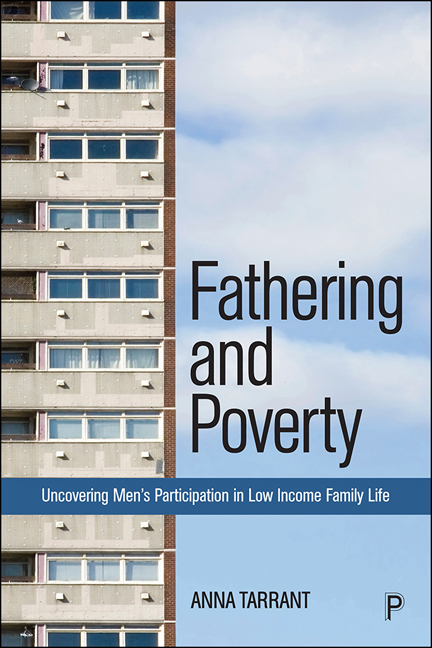Book contents
- Frontmatter
- Dedication
- Contents
- List of figures and tables
- List of abbreviations
- About the author
- Acknowledgements
- 1 Introduction: Fathering, poverty, families and policy
- 2 Low-income fatherhoods in historical and political context
- 3 Theorising men’s participation in low-income families
- 4 Supporting men in low-income contexts: practitioner observations
- 5 Men’s caring arrangements and family trajectories
- 6 Familial economic circumstances and provisioning practices
- 7 Men’s family participation in low-income urban neighbourhoods
- 8 Conclusion: Men’s family participation in low-income contexts
- Appendix A Participant information
- Appendix B ‘Existing evidence’ document shared at the knowledgeexchange workshop
- Notes
- References
- Index
4 - Supporting men in low-income contexts: practitioner observations
Published online by Cambridge University Press: 30 April 2022
- Frontmatter
- Dedication
- Contents
- List of figures and tables
- List of abbreviations
- About the author
- Acknowledgements
- 1 Introduction: Fathering, poverty, families and policy
- 2 Low-income fatherhoods in historical and political context
- 3 Theorising men’s participation in low-income families
- 4 Supporting men in low-income contexts: practitioner observations
- 5 Men’s caring arrangements and family trajectories
- 6 Familial economic circumstances and provisioning practices
- 7 Men’s family participation in low-income urban neighbourhoods
- 8 Conclusion: Men’s family participation in low-income contexts
- Appendix A Participant information
- Appendix B ‘Existing evidence’ document shared at the knowledgeexchange workshop
- Notes
- References
- Index
Summary
A significant context in which men in low-income families negotiate their identities as ‘present’ fathers is in encounters with health and social care services. It is in these contexts that family tensions and disputes in relation to men's roles, responsibilities and rights in connection with their children coalesce, are supported, refuted and sometimes denied (Tarrant and Hughes, 2019). In the first of the empirical chapters of the book, accounts are presented of men's family participation and complex needs as observed by local welfare providers and professionals in the city where the MPLC study was conducted. These accounts render visible the local and national practice and policy contexts contouring men's participation in low-income families and localities and develop an understanding of the (inter)dependencies of men with local services and providers. The findings confirm that marginalised men are most visible to services when they are seeking to secure resources on behalf of their families or in relation to the individual troubles they may experience, such as material deprivation, problems securing employment and/or physical and mental health problems.
The analyses presented in this chapter are interpretations of data generated from informal ethnographic conversations, semi-structured interviews and a knowledge-exchange workshop held with several professionals to share early findings from the secondary analysis work that was conducted using existing data about low-income men (see Chapter 1 and Appendix 2). The professionals who agreed to participate were at the coal-face of changing family patterns and had an accumulated wealth of knowledge about the problems men encounter in their personal and family lives. The findings illustrate the importance of local networks of formal support for families living in hardship, as well as how professionals interpret and respond to men's experiences of marginalisation and disadvantage. Notably, it was service providers working for third sector and voluntary agencies who demonstrated a keen awareness and understanding of the complex needs and experiences of marginalised men and their families in the city. They also interpreted the experiences of the men with whom they were engaging within the policy frameworks and discourses that framed them. The contextual features they describe offer an additional layer of understanding about the local processes and contexts that variously impact on men's family participation and that work to sustain or mitigate against it.
- Type
- Chapter
- Information
- Fathering and PovertyUncovering Men's Participation in Low-Income Family Life, pp. 79 - 100Publisher: Bristol University PressPrint publication year: 2021

